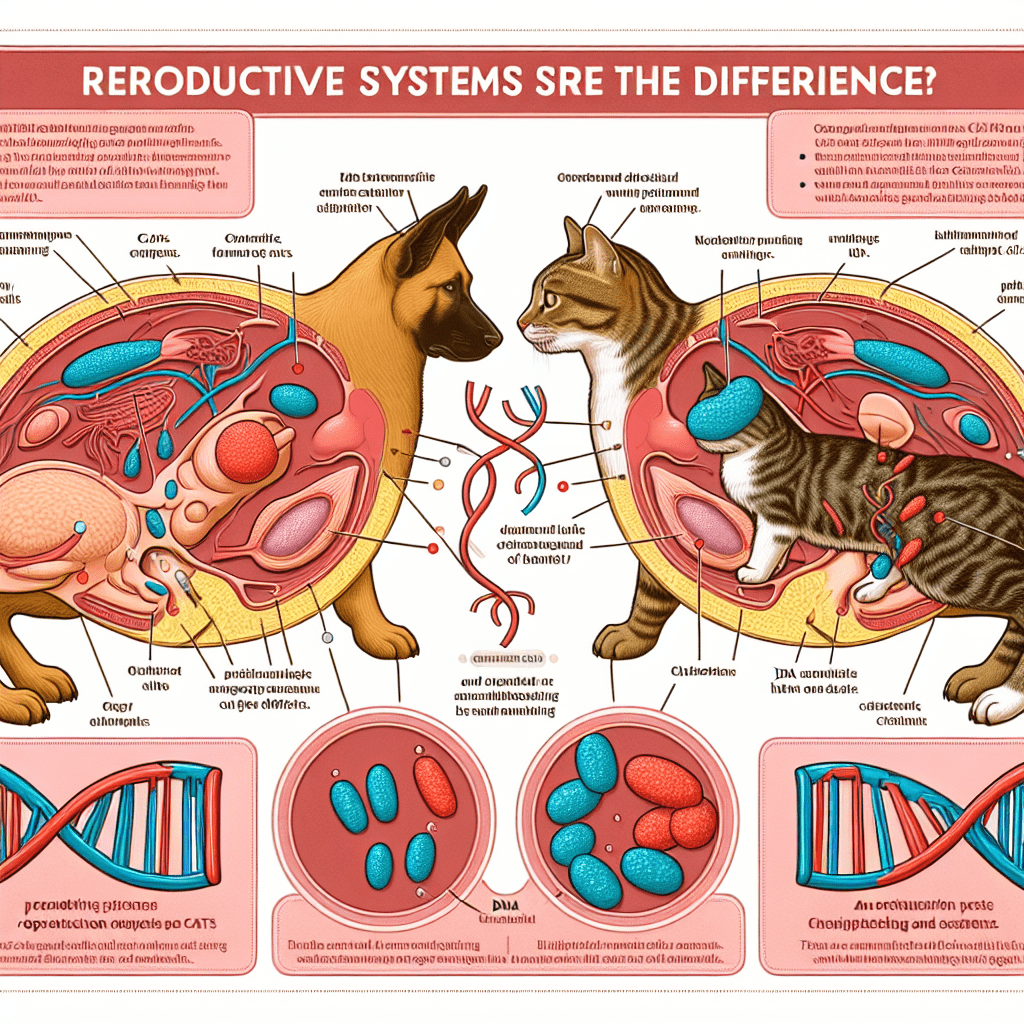Can dogs get cats pregnant? If you’re a pet owner, animal lover, or vet enthusiast, this question has likely crossed your mind. While the idea sounds intriguing, it’s shrouded in myths and misconceptions. This blog post will uncover the biological facts, ethical considerations, and practical advice on pet reproductive health.
Table of Contents
Introduction to Dogs and Cats Breed Together
Interspecies breeding is a topic that fascinates many but is often misunderstood. A dog impregnating a cat might seem possible at first glance. However, the biological factors and interspecies breeding facts tell a different story. This article clarifies these misconceptions and provides valuable insights into responsible pet ownership.

Can Dogs Get Cats Pregnant? – The Science Behind It
So, you’re wondering if dogs can get cats pregnant? Short answer: nope, and here’s the lowdown. When you look into it, dogs and cats are built differently. It’s kind of like trying to plug a USB-C cable into an iPhone charging port—it’s just not happening.
First up, let’s talk chromosomes. Dogs pack 78 of them, while cats roll with 38. For baby-making magic to happen, those numbers need to be closer together, which they’re not. Plus, their parts for making babies? They don’t match up, making it a no-go for a dog’s sperm to fertilize a cat’s egg.
And even if, by some crazy chance, they were compatible that way, their flirting styles are worlds apart. Dogs and cats have special ways of catching each other’s eye that don’t work cross-species. So nature’s got its rules, and a clear line has been drawn regarding dogs and cats.
Real-Life Cases and Misconceptions
Though science clearly states that dogs and cats cannot breed, numerous myths and misconceptions exist. Documented cases often turn out to be false or misunderstood instances of common pet behavior.
These misconceptions often arise from a need for more understanding or misinterpreting animal behavior. Photos or stories circulating on social media can perpetuate these myths. However, it’s essential to rely on expert knowledge and scientific evidence.
Some people might believe that hybrid animals like ligers (a lion-tiger mix) suggest the possibility of a dog-cat hybrid. However, unlike the vast genetic and biological differences between dogs and cats, such hybrids occur within more closely related species.
Ethical and Health Considerations
Even if breeding across species were feasible, it would entail significant ethical and health concerns. Responsible pet ownership demands an appreciation for and adherence to nature’s limits.
From an ethical standpoint, attempting to crossbreed animals from distinct species can inflict distress and injury on the animals involved. Such forced breeding experiments often lead to serious health complications and suffering.
In terms of health, the anatomical disparities between species mean that any attempt at forced mating could result in physical injury. Moreover, offspring from such unions would likely face severe genetic defects.
How to Prevent Unwanted Pregnancies in Pets
Preventing unwanted pregnancies in pets is crucial for maintaining their health and well-being. Here are some practical steps:
Spaying and Neutering:
This method is a game-changer for preventing unwanted pregnancies. It also has some health perks, like lowering the risk of some cancers.
Supervised Playtime:
Always supervise your pets when they interact with other animals. This minimizes the chances of unintended mating.
Secure Living Environment:
Ensure your pets live in secure environments where encounters with other animals are controlled and monitored.
Understand Their Cycles:
Knowing your pet’s reproductive cycle can help you manage their interactions during fertile periods.
Conclusion
In summary, the idea of dogs getting cats pregnant is a biological impossibility. Understanding the science behind dog and cat reproduction can help pet owners make informed decisions. Interspecies breeding myths can lead to harmful practices that jeopardize animal welfare. Pet owners must educate themselves and practice responsible pet ownership.
Continuing the Conversation
We trust this blog post has clarified your queries regarding interspecies breeding and cleared up any misunderstandings you may have held. Owning a pet carries significant responsibility, and comprehending the nuances of pet reproductive health is a critical aspect of that.
Feel free to share your thoughts and experiences in the comments below. If you’d like to learn more about responsible pet ownership, don’t hesitate to check out our other articles.
Frequently Asked Questions (FAQ)
Q: Can a dog and cat become romantically interested in each other?
A: While dogs and cats can form strong bonds and even show affection toward one another, their interactions are usually driven by companionship rather than romantic interest. They communicate and express affection differently, guided by their species-specific behaviors.
Q: Have any documented instances of dogs breeding with cats or vice versa?
A: No, there are no scientifically verified cases of dogs impregnating cats or vice versa. Any claims of such occurrences are based on misunderstandings or misinterpreted animal behaviors.
Q: Can hybrids between vastly different species ever exist?
A: Hybrid animals like ligers (a lion and tiger mix) are usually possible when the parent species are closely related. However, dogs and cats are too genetically distant and have incompatible chromosome numbers, making such hybrids impossible.
Q: What occurs if my dog or cat tries to mate with a different species?
A: If your pet tries to mate with another species, it typically leads to no biological outcome due to their reproductive incompatibility. However, it’s important to supervise such interactions carefully to prevent stress or injury to either animal.
Q: How can I ensure the reproductive health of my pets?
A: To maintain your pets’ reproductive health, consider spaying or neutering them, provide regular veterinary check-ups, and educate yourself about their reproductive cycles. These steps will help prevent unwanted pregnancies and promote overall health.
Q: Is it harmful to force animals of different species to mate?
A: Yes, forcing animals of different species to mate can cause significant stress, harm, and physical injury. It’s unethical and against the principles of responsible pet ownership. Respecting the natural boundaries set by biology is crucial for the well-being of pets.
Feel free to contact us if you have more questions or need further information. We’re here to help with all aspects of responsible pet ownership.
Sarah Smith is a passionate dog and cat enthusiast, blogger, and pet care expert. With years of experience researching and writing about various dog breeds cat breeds, she brings a wealth of knowledge and insight to her blog, PetPession.com. Sarah loves exploring the unique traits, histories, and care needs of different breeds, helping pet owners make informed decisions. Her mission is to create helpful, friendly, and well-researched content that both educates and celebrates the joy of pet ownership. When she’s not writing, Sarah enjoys outdoor adventures with her own furry friends.

